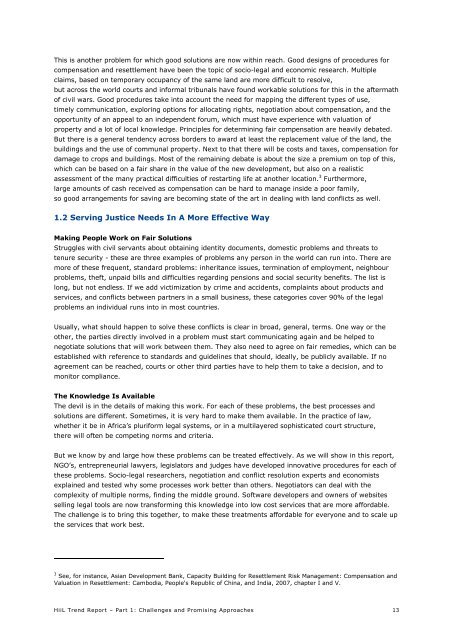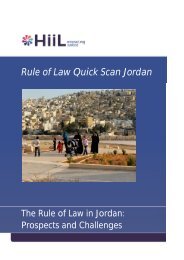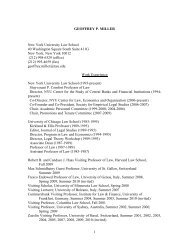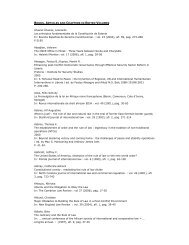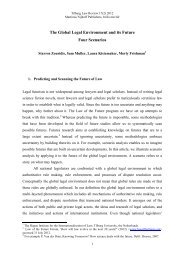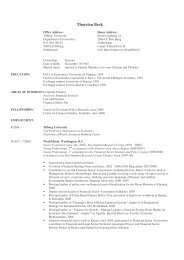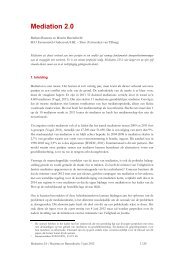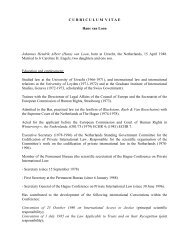Trend Report | Part 1 - HiiL
Trend Report | Part 1 - HiiL
Trend Report | Part 1 - HiiL
Create successful ePaper yourself
Turn your PDF publications into a flip-book with our unique Google optimized e-Paper software.
This is another problem for which good solutions are now within reach. Good designs of procedures for<br />
compensation and resettlement have been the topic of socio-legal and economic research. Multiple<br />
claims, based on temporary occupancy of the same land are more difficult to resolve,<br />
but across the world courts and informal tribunals have found workable solutions for this in the aftermath<br />
of civil wars. Good procedures take into account the need for mapping the different types of use,<br />
timely communication, exploring options for allocating rights, negotiation about compensation, and the<br />
opportunity of an appeal to an independent forum, which must have experience with valuation of<br />
property and a lot of local knowledge. Principles for determining fair compensation are heavily debated.<br />
But there is a general tendency across borders to award at least the replacement value of the land, the<br />
buildings and the use of communal property. Next to that there will be costs and taxes, compensation for<br />
damage to crops and buildings. Most of the remaining debate is about the size a premium on top of this,<br />
which can be based on a fair share in the value of the new development, but also on a realistic<br />
assessment of the many practical difficulties of restarting life at another location. 3 Furthermore,<br />
large amounts of cash received as compensation can be hard to manage inside a poor family,<br />
so good arrangements for saving are becoming state of the art in dealing with land conflicts as well.<br />
1.2 Serving Justice Needs In A More Effective Way<br />
Making People Work on Fair Solutions<br />
Struggles with civil servants about obtaining identity documents, domestic problems and threats to<br />
tenure security - these are three examples of problems any person in the world can run into. There are<br />
more of these frequent, standard problems: inheritance issues, termination of employment, neighbour<br />
problems, theft, unpaid bills and difficulties regarding pensions and social security benefits. The list is<br />
long, but not endless. If we add victimization by crime and accidents, complaints about products and<br />
services, and conflicts between partners in a small business, these categories cover 90% of the legal<br />
problems an individual runs into in most countries.<br />
Usually, what should happen to solve these conflicts is clear in broad, general, terms. One way or the<br />
other, the parties directly involved in a problem must start communicating again and be helped to<br />
negotiate solutions that will work between them. They also need to agree on fair remedies, which can be<br />
established with reference to standards and guidelines that should, ideally, be publicly available. If no<br />
agreement can be reached, courts or other third parties have to help them to take a decision, and to<br />
monitor compliance.<br />
The Knowledge Is Available<br />
The devil is in the details of making this work. For each of these problems, the best processes and<br />
solutions are different. Sometimes, it is very hard to make them available. In the practice of law,<br />
whether it be in Africa’s pluriform legal systems, or in a multilayered sophisticated court structure,<br />
there will often be competing norms and criteria.<br />
But we know by and large how these problems can be treated effectively. As we will show in this report,<br />
NGO’s, entrepreneurial lawyers, legislators and judges have developed innovative procedures for each of<br />
these problems. Socio-legal researchers, negotiation and conflict resolution experts and economists<br />
explained and tested why some processes work better than others. Negotiators can deal with the<br />
complexity of multiple norms, finding the middle ground. Software developers and owners of websites<br />
selling legal tools are now transforming this knowledge into low cost services that are more affordable.<br />
The challenge is to bring this together, to make these treatments affordable for everyone and to scale up<br />
the services that work best.<br />
3 See, for instance, Asian Development Bank, Capacity Building for Resettlement Risk Management: Compensation and<br />
Valuation in Resettlement: Cambodia, People's Republic of China, and India, 2007, chapter I and V.<br />
<strong>HiiL</strong> <strong>Trend</strong> <strong>Report</strong> – <strong>Part</strong> 1: Challenges and Promising Approaches 13


